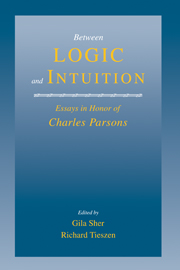Book contents
- Frontmatter
- Contents
- Preface
- I LOGIC
- Paradox Revisited I: Truth
- Paradox Revisited II: Sets – A Case of All or None?
- Truthlike and Truthful Operators
- ‘Everything’
- On Second-Order Logic and Natural Language
- The Logical Roots of Indeterminacy
- The Logic of Full Belief
- II INTUITION
- III NUMBERS, SETS AND CLASSES
- Name Index
‘Everything’
Published online by Cambridge University Press: 02 December 2009
- Frontmatter
- Contents
- Preface
- I LOGIC
- Paradox Revisited I: Truth
- Paradox Revisited II: Sets – A Case of All or None?
- Truthlike and Truthful Operators
- ‘Everything’
- On Second-Order Logic and Natural Language
- The Logical Roots of Indeterminacy
- The Logic of Full Belief
- II INTUITION
- III NUMBERS, SETS AND CLASSES
- Name Index
Summary
Ontology, as Aristotle conceived it, is the most general of sciences. The other sciences are specialized, restricting their attention to some proper part of reality. It remains for ontology to take account of everything there is.
The question I would like us to investigate here is not a problem in ontology, but a problem in the meta-theory of ontology. I want to know whether, given the limits of logic and language, a science such as ontology is even possible, there being some reason to fear that we lack the conceptual resources to formulate a fully general science, because we have no any way reliably to ensure that our quantifiers range over everything there is. Even if we succeed in convincing ourselves that there is no logical impediment to the development of a fully general science, it will remain to be seen whether such a science has anything interesting to tell us. It could happen that the fully general truths are too abstract to be very important, and it could also happen that the fully general truths are beyond our epistemic reach, so that, while we are privileged to know rather a lot about our immediate surroundings, we are not in a position to know much of anything about the universe as a whole. But first things first.
The logical worry comes from the interplay of context and quantification. Often we use such words as ‘each’, ‘any’, ‘every’, ‘all’, ‘anyone’, ‘everyone’, and ‘everything’ without intending to talk about everyone and everything.
Information
- Type
- Chapter
- Information
- Between Logic and IntuitionEssays in Honor of Charles Parsons, pp. 54 - 78Publisher: Cambridge University PressPrint publication year: 2000
Accessibility standard: Unknown
Why this information is here
This section outlines the accessibility features of this content - including support for screen readers, full keyboard navigation and high-contrast display options. This may not be relevant for you.Accessibility Information
- 29
- Cited by
